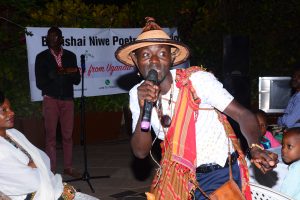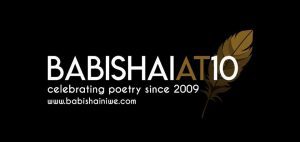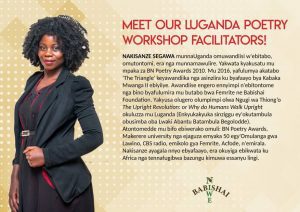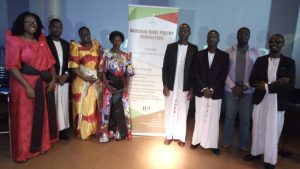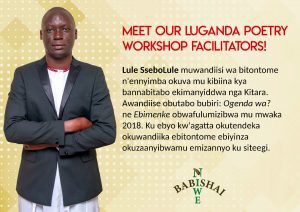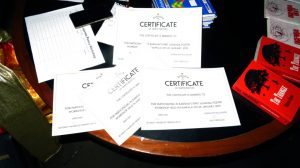BABISHAI Poetry Meets Buganda Culture
The morning started off with a cloudy musk; easily mistaken for the start of a bad day but that did not stop the Babishai team. It was just another amazing step into the future of poetry with the event of the organisation’s first ever Luganda Poetry Workshop.
At the venue, 4reign Worship Auditorium, Equatorial Shopping Mall, the place was arranged, inviting for a potential poetry storm.
Clad in wide smiles and Buganda traditional attire, the gomesi (for women) and kanzu (for men), the Babishai team, led by its Founder Beverly Nambozo Nsengiyunva, was definitely dressed for the occasion. The entire team spared a moment for a short photo shoot, as they embraced this rarely stumbled upon Buganda look by Babishai Niwe. It was such a rebirth moment!
The Luganda Poetry Workshop kicked off right on cue 10am with introductions and welcoming remarks from one of Uganda’s finest Luganda poet performers, Nakisanze Segawa, but unlike any of the other past events, it was clear that the mode of communication was different, all messages and conversations were packaged in Luganda, the commonest local language in Uganda. Nakisanze introduced Babishai; highlighting that from inception in 2009, Babishai awarded Ugandan women poets through an annual competition, promoting and expanding platforms for publishing and performance. Nakisanze herself, was a Babishai poet awardee in 2010 and since then has published a novel, entitled, The Triangle, which is itself immersed in Ganda culture.
It was not so long before the main Luganda workshop facilitator, Lule Ssebo Lule, took to the stage to speak about the origin of Poetry (ebitontome) in Buganda and how it has continued to manifest in all aspects of our lives, still buried deep in our roots.
Ssebo Lule described Poetry as a wonderful play of words or sentences with a special / hidden meaning and that has rhythm, lovely to the ear. He gave the examples of traditional sayings and proverbs, songs, clan anthems, lullabies and children play-songs. Even though not many people think of them as part of poetry, they are.
He mentioned that even Luganda poetry made use of similar techniques (entunnunsi) like the repetition of certain words and sounds (okuwaawaanya”), similar end of word/sentence patterns, freestyle (no clear pattern or a mix of styles), faibbles (enfumo) which is the use of animal characters and the use of dialogue.
Majority of poetry in the past was mainly created for the amusement of the royal family, as well as to preserve culture through constant re-education of the children, used to express the perspective of the Buganda culture on different aspects of life.
Some of this traditional poetry was actually used to hide and obscure messages like when grown-ups spoke amidst children but dint wish for them to understand and also in war times, for the same reason against enemies.
The workshop soon broke into poetry performances as both Naki and Lule Ssebo Lule featured several poems from their collections; demonstrating the different styles of wordplay that exist in the Buganda culture. Even some people who did not understand the local language Luganda, still enjoyed the songs, vivid demonstrations and transformation of the poems into life.
The poems’ themes ranged from simple conversations among peers to more controversial issues like the unexplained female deaths that plagued the nation a short while ago. The tables soon turned and it was the audience that was charged with creating short 5 – 10-verse poems in short 15-minute breaks and reciting them to demonstrate how just anyone can be a poet.
The Question and Answer session centred on the preparation of Luganda poetry and its techniques; furthermore were questions on controversial and culturally sensitive topics and how they should be approached.
Naki had performed some politically-sensitive poems that she had only engaged in once. That was due to the audience reception and post-performance comments. She however called upon poets to be brave and take risks because poetry is one of the avenues to address social-political matters.
Lue Ssebo Lule then stressed how just anyone could make a living through Luganda Poetry giving, while citing examples through making music, cultural or poetry audio books, Selling your own poetry & performances, Story writing, Radio &TV announcements, MC-ing at traditional events among many others.
Just before the end of the program Ssebo Lule took a moment to address the matter of poetic license (olukusa lw’omutontozi) which he said allows the poet to achieve their poetic goal without necessarily observing full grammatical or poetic rules for example, link words in different verses or even by cutting the words shorter and using jargon.
The intentional imbalance of sentence / word length between verses, borrowing words from other languages; especially when there is no alternative / matching word and the intentional imbalance of stanza length can also be excused due to poetic license.
With the crowd all-smiles and lunchtime in our faces, it was time to close the workshop. There was a bookstall with a collection of Babishai created, compiled or affiliated poetry books were on sale ranging from a very pocket-friendly UGX 5,000 – 30,000/-
The Babishai Niwe bookstall consisted of a variety of books; Naki’s book, “The Triangle” (2016) and Ssebo Lule’s books “Ogenda Wa?” (2018) which in English translate respectively into “where are you going?” and “Ebimenke!” (2018), translated into, “the beasts / the monsters!” The other Babishai Poetry anthologies were, “A Thousand Voices Rising,” “When Children Dare to Dream: A Children’s Poetry and Short Story Anthology and “Boda Boda Anthem: A Kampala Poetry Anthology.”
The workshop signified a breaking of the glass ceiling: With the premise of poetry on oral tradition; and with the richness of performance in local languages, this Luganda workshop, was the first of many and would extend to various audiences, with poetry publications in the future.
Below is an account by Lule Ssebo Lule, of his experience in facilitating Babishai’s first ever Luganda poetry workshop.
Written in Luganda, with an English translation:
Okusookera ddala, njagala okwebaza mukyala Beverley Nambozo Nsengiyunva, olw’okumpa omukisa okugabana amagezi gange n’abantu abalala mu musomo gwa Babishai Niwe Foundation ogw’okuwandiika ebitontome mu lulimi Oluganda ogwaliwo nga 26/01/2019 ku 4Reign mu Kampala. Anti etasiima ebula agiwa. Newakubadde nze eyali omusomesa, nayiga ebintu ebiwerako okuva ku bayizi abaagwetabamu, n’abakozi ba Babishai bennyini. Kyali kisannyusa nnyo, era kizaamu ammaanyi okulaba nti ennimi ezaffe ennansi zitandise okulowoozebwako mu kawefube w’okutendeka abantu okuwandiika ebibakwatako n’ebitundu gye bava nga bayita mu bitontome. Neera, mwebale nnyo bannaffe aba Babishai. Anaaseera owuwe, nti leka ab’ebweru balye. Mwebale kujjukira nnimi zaffe eza wano.
Nga twetegekera omusomo ogwo, nze n’abakozi ba Babishai Niwe twatuula ne twogera, ne tuseka, ne tukkanya ku bintu eby’enjawulo. Omwo nafunamu emikwano emipya, n’okumanya endowooza z’abantu. Nzijjukira olunaku lwe twakubwa ebifaananyi (nze ne mukyala Nakisanze Ssegawa) n’okukwata akalango k’omusomo ku viidiyo. Enkuba yasiiba etonnya, naye tekyatulobera kumaliriza bulungi buli kimu. Wabula ndowooza ekyasinga okunyumira kyali mu musomo. Bannaffe abamu baali tebamanyi bulungi kuwandiika lulimi Luganda naye baafuba ne betaba mu mirimu gy’okuwandiika ebitontome gye nabawanga. Nze nga omusomesa, waliwo ebintu bye nayiga okuva mu kunoonyereza kwe nakola nga omusomo tegunnatuuka. Osanga saandibizudde singa teyali Babishai.
Ekirala ekyansanyusa ku musomo ogwo nti ab’amawulire okuva ku mikutu egy’enjawulo baatwegatako ne bakwata ebifaananyi byaffe n’amaloboozi ne bibuna ensi akawungeezi k’olunaku olwo lwennyini. Aba Star TV baabiraga ku mawulire gaabwe ag’essaawa essatu, n’aba Bukedde FM baabiteekako ku ssaawa zeezimu. Mba ndi ewaka mpumudde, nga mukwano gwange ampeereza bubaka ku ssimu nti andabye ku TV nga ntontoma. Eyandabisa mu kanzu! Ffe abasomesa (nze ne Nakisanze Ssegawa) n’abakozi ba Babishai twali tuteekedwa okwambala ekanzu oba gomesi. Nkugambye! Omukolo gwabulako bugombe na miwumbo gya mmere.
Mu musomo ogwo, tetwayogera ku kuwandiika bitontome kwokka. Abantu baatubuuza ebintu nga; engeri y’okutereka ebitontome mu bwongo, engeri y’okubifunamu ekigulira magala eddiba, engeri y’okutontoma, engeri y’okuteeka ebitontome mu mizannyo ku siteegi, n’ebirala. Nzikiriza nti abaagwetabamu baaganyulwa nnyo era bye baayigamu bajja kubikozesa okukyusa obulamu bwabwe n’obwabantu abalala nga bayita mu kuwandiika n’okutontoma. Mwebale kujja. Mwebale kwagala kuyiga.
I would love to send special thanks to Mrs. Beverley Nambozo Nsengiyunva for giving me a chance to share my knowledge at the Babishai Niwe Luganda Poetry Workshop that took place on 26/01/19 at 4Reign in Kampala. Although I was the facilitator of the workshop, I learned a great deal from the participants and the Babishai Niwe Foundation team. It was humbling and exciting to see indigenous languages being acknowledged as of tremendous value in the campaign to teach people how to improve their lives and societies through poetry writing and performance. Again, Babishai Niwe deserves the gratitude.
In preparation for the workshop, I met with the Babishai team and we brainstormed, laughed, and agreed on several issues. Through that experience, I gained new friends and learned about their different opinions on poetry writing and performance and the culture of the Baganda. I remember the day myself and Nakisanze Ssegawa were to have a photoshoot and record video adverts for the workshop. It had been raining since morning but the shoot was successful. My best moment was during the workshop itself. We had participants who couldn’t write correct Luganda but they took part in every writing exercise I gave. As the facilitator, I had to make research in preparation and I learned new concepts about Luganda poetry that I didn’t know before.
The other exciting memory of the workshop was when we were joined by journalists from different media houses who took audio and video footage. On the same day, the footage was broadcasted on Star TV and Bukedde FM at 9pm respectively. We, the facilitators and the Babishai team were elegantly dressed in kanzus and gomesis.
At the workshop, we didn’t talk about only Luganda poetry writing. The participants asked questions regarding poetry memorization, making money out of poetry, the right way to perform Luganda poetry, how to create stage plays out of poetry, and so on. I strongly believe that the skills the participants learned at the workshop shall help them improve their lives and those of the people around them. I thank everyone who helped make the workshop a success.
-Lule SseboLule
The Babishai Poetry Foundation shall celebrate their tenth anniversary from 21-25 March, in Kabale and Kampala.
Article Written by Francis Mukisa.
First published on Sooo Many Stories.
